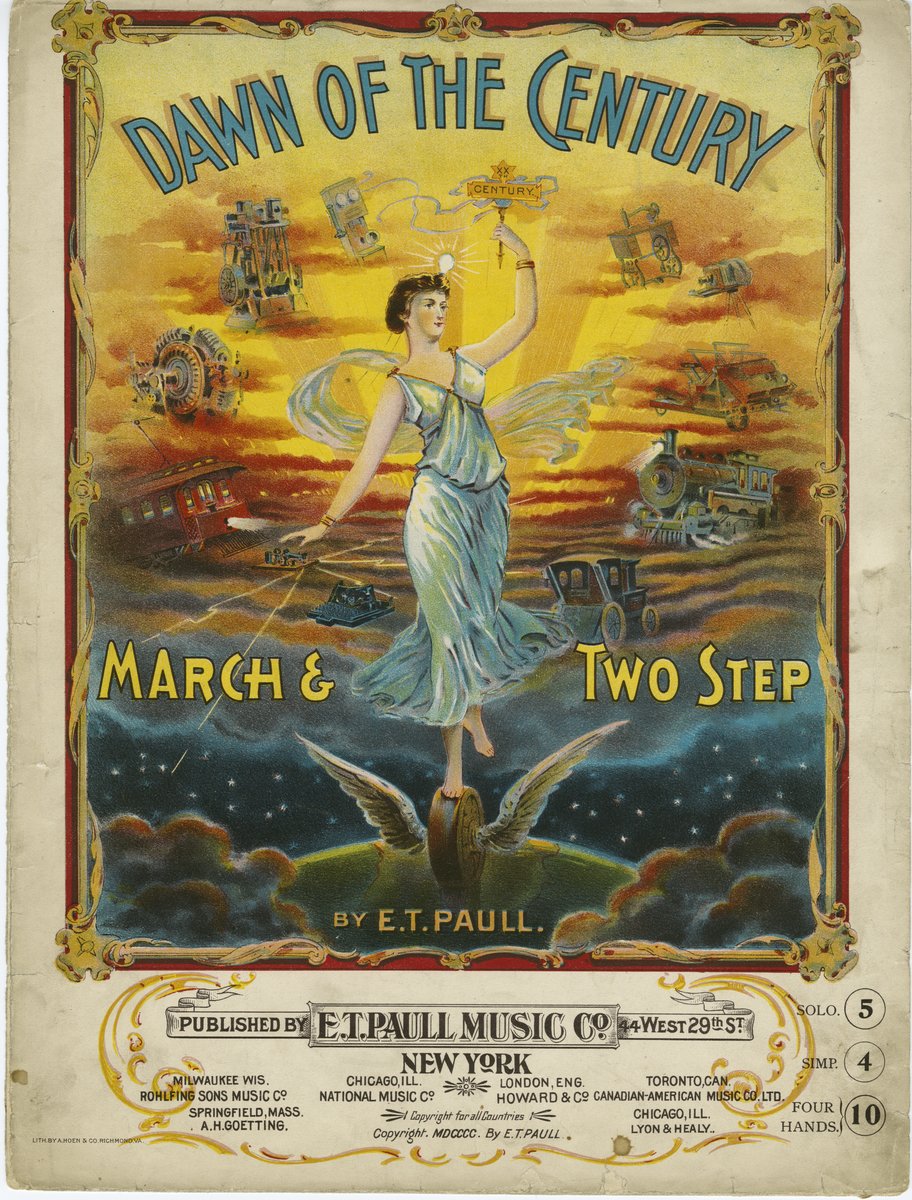E. T. Paull on:
[Wikipedia]
[Google]
[Amazon]
Edward Taylor Paull (February 16, 1858 – November 25, 1924) was a minor American
 *''A Signal From Mars''
*''A Signal From Mars''
composer
A composer is a person who writes music. The term is especially used to indicate composers of Western classical music, or those who are composers by occupation. Many composers are, or were, also skilled performers of music.
Etymology and Defi ...
, arranger
In music, an arrangement is a musical adaptation of an existing composition. Differences from the original composition may include reharmonization, melodic paraphrasing, orchestration, or formal development. Arranging differs from orches ...
, and sheet music
Sheet music is a handwritten or printed form of musical notation that uses List of musical symbols, musical symbols to indicate the pitches, rhythms, or chord (music), chords of a song or instrumental Musical composition, musical piece. Like ...
publisher.
Personal life
He was born in Gerrardstown, in what is nowWest Virginia
West Virginia is a state in the Appalachian, Mid-Atlantic and Southeastern regions of the United States.The Census Bureau and the Association of American Geographers classify West Virginia as part of the Southern United States while the Bur ...
, and died in Brooklyn, NY
Brooklyn () is a Boroughs of New York City, borough of New York City, coextensive with Kings County, in the U.S. state of New York (state), New York. Kings County is the most populous Administrative divisions of New York (state)#County, county i ...
.
Musical career
He had some success with a few titles which enabled him to set up his own self-publishing company. His music was intended for the piano sheet music trade. His first publication was for the Richmond Music Company in Richmond, VA where he was general manager. The first publication was ''The Chariot Race or Ben Hur March'' with a full-color cover. Paull's success with Ben Hur, prompted him to use it in his marketing as he moved into the music teaching market and the phonograph manufacturing business. He began publishing in 1894, specializing in marches. He is known for his 1905 march entitled, ''Paul Revere's Ride'' which was dedicated to theDaughters of the American Revolution
The Daughters of the American Revolution (DAR) is a lineage-based membership service organization for women who are directly descended from a person involved in the United States' efforts towards independence.
A non-profit group, they promote ...
.
In order to sell music, the music was marketed with uniquely colorful front cover illustrations to catch the eye of buyers. He was the first music publisher to use five-color lithography for his sheet music. For this reason alone, music published by his firm has become highly collectible in the modern era and has latterly aroused interest in the composer.
To further boost sales, he marketed his music as "descriptives" and ascribed certain sections of the music to allude to certain depictions of events on the cover illustration. This type of publication alludes to its being comparable to program music whilst never achieving the requisite complexity. The marketing of the pieces as "descriptives" (often a latter enhanced recycling of earlier published material) enabled the same music to be sold a second time around to the wide market of beginner-level pianists who had been accustomed to fare of this kind since Pridham's "Battle March of Delhi" in the mid-19th century. On this musical level, his true contemporaries were the British writers Ezra Read and Theo Bonheur of the same period.
Compositions
1894
*''The Chariot Race or Ben Hur March''1895
*''The Old Man's Story'' *''The Stranger's Story Song, or Why Do Our Loved Ones Leave Us''1896
*''Charge of the Light Brigade'' *''The Della Fox Little Trooper March'' *''The Elk's Grand March'' *''Get Off Cuba's Toes'' *''Great New York'' *''Loan Me A Nickel'' *''The New York and Coney Island Cycle March'' *''The Stranger's Story Waltz'' *''Sweet Rosa Dugan From Hogan's Alley'' *''What Might Have Been'' *''Whisper Again Sweet I Love You'' *''You'll Always Find A Welcome For You At Home Sweet Home''1898
*''America Forever! March'' *''He's Goin' to Hab a Hot Time Bye & Bye'' /Harry S. Miller*''The Ice Palace March'' *''If You Were Only By My Side'' *''Uncle Jasper's Jubilee'' *''We'll Stand by the Flag''1899
*''A Warmin' Up In Dixie''1900
*''Dawn of the Century'' *''A Signal From Mars''
*''A Signal From Mars''
1901
*''Our Wedding Bells Will Ring Out Some Day'' /Arthur Treveylan*''When Johnny Goes A Camping'' /Vincent P. Bryan*''The Witch's Whirl''1902
*''The Storm King''1903
*''The Burning of Rome''1904
*''The Circus Parade'' *''The Romany Rye''1905
*''The Jolly Blacksmiths'' *''Paul Revere's Ride'' and1906
*''Silver Sleigh Bells''1907
*''The Triumphant Banner'' *''The Masquerade''1908
*''The Home Coming March''1909
*''Lincoln Centennial Grand March'' *''The Dashing Cavaliers''1912
*''The Roaring Volcano'' *''Ring Out, Wild Bells''1913
*''Kaiser Jubilee March''1914
*''Paull's Hesitiation Waltz'' *''Herald of Peace March''1915
*''Battle of the Nations
The Battle of Leipzig (french: Bataille de Leipsick; german: Völkerschlacht bei Leipzig, ); sv, Slaget vid Leipzig), also known as the Battle of the Nations (french: Bataille des Nations; russian: Битва народов, translit=Bitva ...
''
*''Tipperary Guards''
1916
*''Woman Forever''1917
*''Battle of Gettysburg''1918
*''Pershing's Crusaders'' *''Hurrah! For the Liberty Boys, Hurrah!'' * Words and music by Harry Kennedy. Re-arranged and revised by Paull. ''Say "au revoir" but not good bye.''1919
*''American Wedding March'' *''Spirit of France''1922
*''Sheridan's Ride'' *''Custer's Last Charge''1924
*''The Four Horsemen of the Apocalypse'' *''Spirit of the U. S. A.''1926
*''Top of the World'' (published posthumously)References
{{DEFAULTSORT:Paull, Edward Taylor 1858 births 1924 deaths American male composers American composers Sheet music publishers (people) American music publishers (people) People from Berkeley County, West Virginia